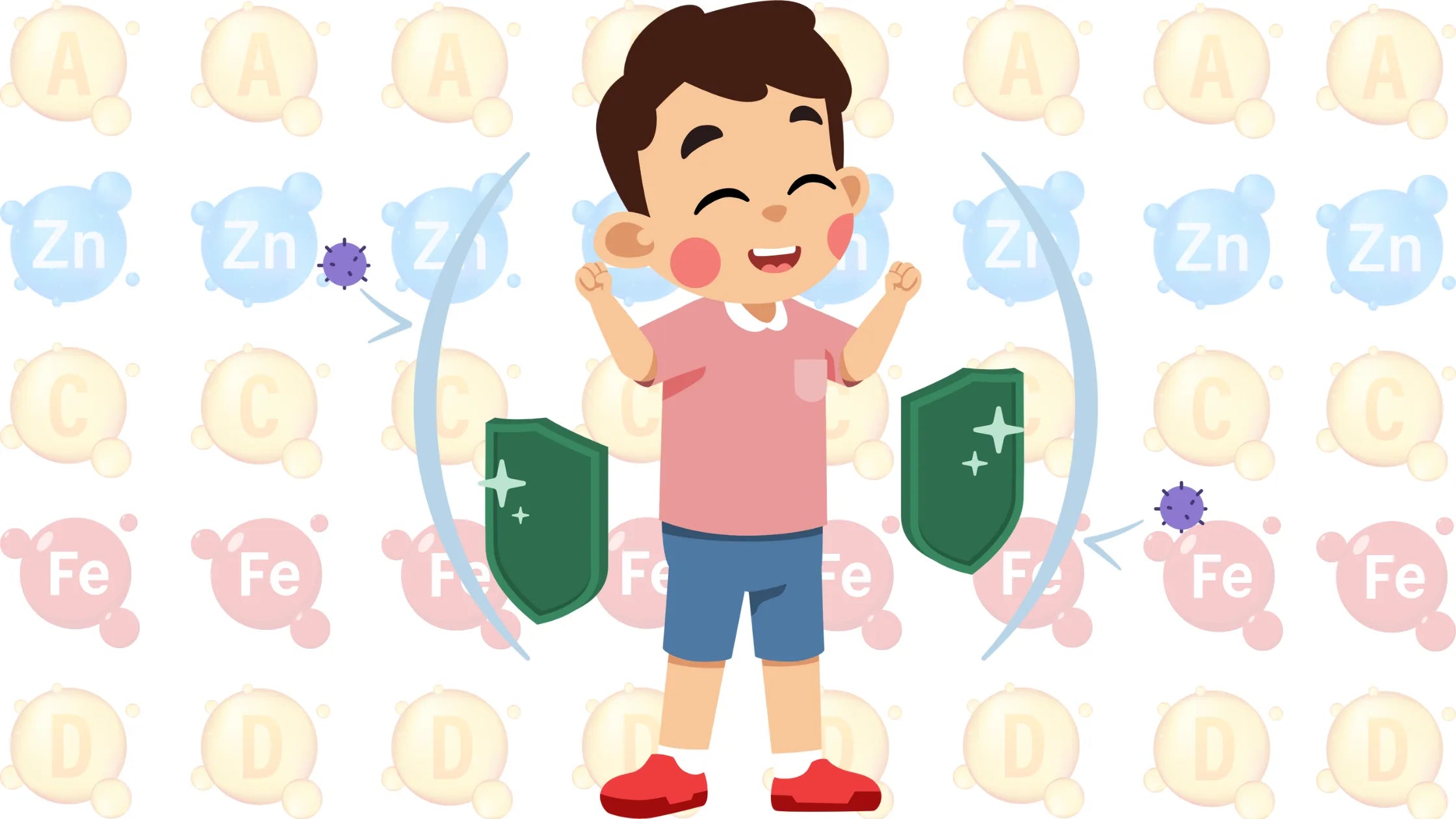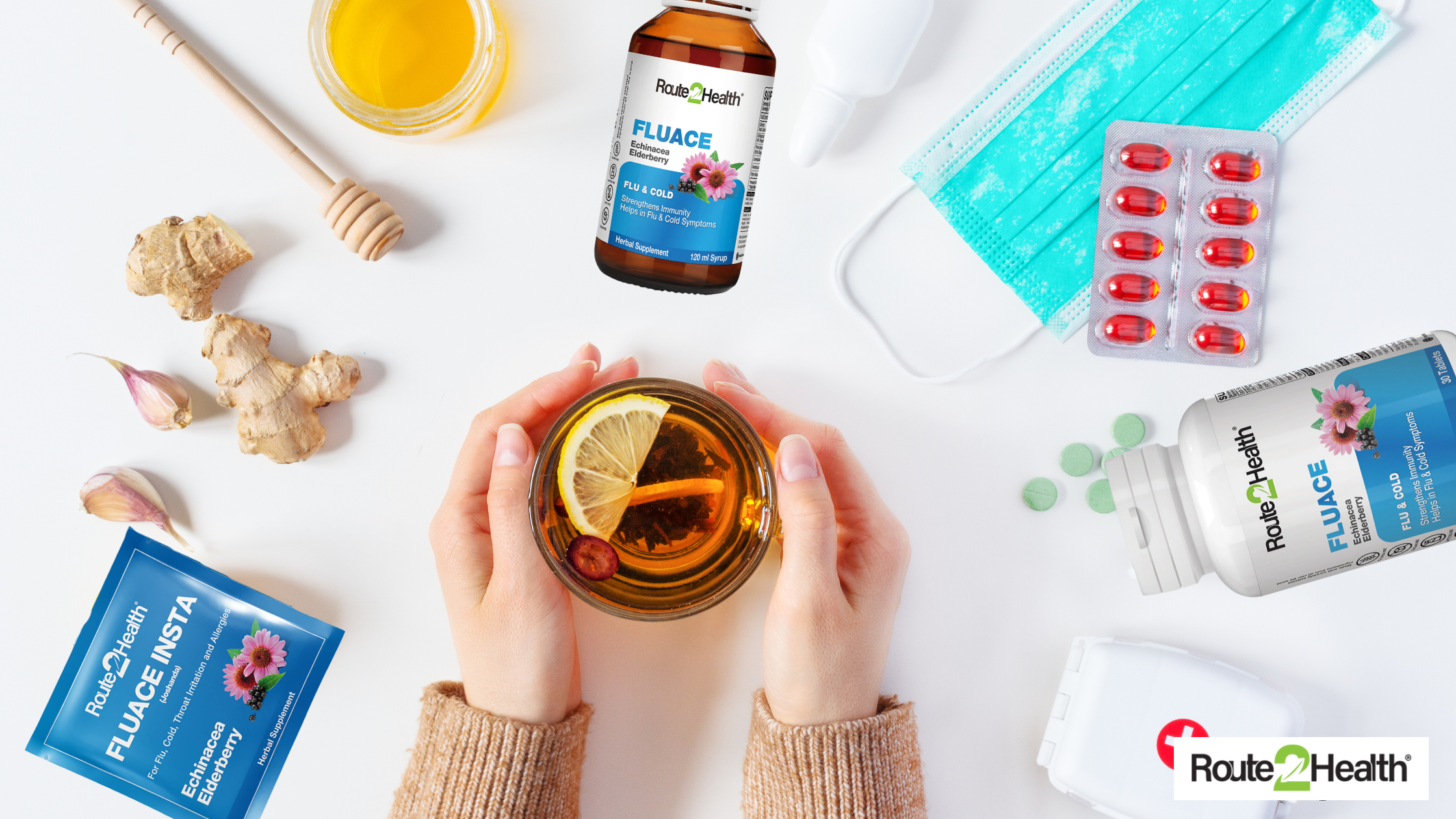What Are The Essential Kids’ Immunity Vitamins?
Kids’ immunity vitamins help build immunity and strengthen the defence system, helping the body fight infections and illness. They are necessary nutrients for maintaining and developing the immune system. They assist in the creation of immune cells, combat infections, and give the body the abilities it needs to fight against germs and viruses. These vitamins are naturally found in various foods. Still, parents frequently turn to supplements when children are ‘picky eaters’, meaning they have a limited diet and may not consume various foods.
The essential immunity vitamins include:
- Vitamin C
- Vitamin D
- Vitamin A
- Zinc
- Iron
Role Of The Essential Kids’ Immunity Vitamins
1. Vitamin C (Immunity Booster)
Vitamin C is known for its immune-boosting qualities, is one of the most important kids’ immunity vitamins. It stimulates the development of white blood cells, which is critical in battling infections. According to a study by the National Institutes of Health, vitamin C is an antioxidant, shielding the body from harm produced by free radicals.
Deficiency can decrease immune responses and increase vulnerability to infections. Studies have shown that vitamin C intake may lower the length and severity of colds and other respiratory illnesses.
Citrus fruits such as oranges, lemons, strawberries, bell peppers, and broccoli are good sources. The RDI (recommended daily intake) for children ranges from 15 to 75 mg, depending on their age.
2. Vitamin D (Sunshine Vitamin)
Vitamin D is yet another one of the essential kids’ immunity vitamins. It enhances immunological responses by enhancing the pathogen-fighting capacities of monocytes and macrophages—white blood cells necessary for immune defence. It is also associated with a lower incidence of respiratory infections.
According to the NIH Fact Sheet, the RDI for children ranges from 400-600 IU.
3. Vitamin A (Barrier Builder)
A study by the National Institute of Health says Vitamin A is essential for the skin’s health and mucosal obstacles, especially the respiratory tract. It serves as the body’s first line of defence against pathogens, helping your body’s natural defence against illness and infection (the immune system) function effectively. It also keeps the outer layer of skin and lining of certain bodily parts, such as the nose, healthy.
Sources include carrots, sweet potatoes, spinach, and other colourful veggies. The recommended daily intake for children is 300-600 µg.
4. Zinc (Immune Cell Supporter)
Although zinc is not one of the kids’ immunity vitamins per se, it is an essential immunity nutrient. It is necessary for the proper growth and function of immunological cells. It also decreases inflammation and guards against prevalent colds and respiratory tract infections.
Zinc is a vital vitamin that aids the immune system in combating bacteria and viruses. A study published by the National Institute of Health says it is also essential for the growth and function of cells that mediate nonspecific immunity, such as natural killer cells and neutrophils.
Sources include beans, nuts, dairy products, and meat. The recommended daily intake for children is 2-8 mg, depending on age.
5. Iron (Energy Booster)
Although not a vitamin, Iron is essential for immune system health because it promotes immune cell formation and activity. Specifically, iron aids in the maturation of lymphocytes, which are necessary for infection resistance.
A study says Iron deficiency can severely impair immunological function. Low iron levels decrease the body’s ability to create enough white blood cells, reducing the immune response and rendering persons more susceptible to infections.
The primary sources of iron are animal liver, tomato, beef, spinach, raisins and lentils. The RDI of iron is 7-12 months and is 11 mg/day, depending on age.
Are Supplements Needed To Get Enough Kids’ Immunity Vitamins?
While a well-balanced diet is usually sufficient to provide most of the vitamins children need, there are times when supplements may be necessary.
- Growth Phases: Children require extra nourishment at times of rapid growth.
- Seasonal changes: The winter months can result in less sun exposure and a shortage of Vitamin D
- Frequent illnesses: If your child is experiencing frequent colds, flu, or other respiratory infections, they may have a compromised immune system and could benefit from an immunity supplement

Natural Sources vs Supplements
Natural food sources deliver nutrients in their most balanced and accessible forms and additional beneficial substances such as fibre, antioxidants, and phytonutrients, all of which promote improved absorption and health. In contrast, supplements are concentrated forms of certain nutrients, such as vitamins or minerals, intended to replace dietary gaps or treat deficiencies. While supplements are handy, they frequently lack the synergistic advantages of whole foods and may not be absorbed as effectively. Natural foods provide a greater spectrum of nutrients, whereas supplements address specific needs.
Natural Sources
Fruits, vegetables, dairy, and whole grains are natural sources of vitamins for children. They are readily available and easily incorporated into your child’s diet.
For example
- Citrus fruits contain vitamin C
- Vitamin A from carrots and sweet potatoes
- Zinc from nuts and beans
Supplements
It’s important to remember that while supplements can be beneficial, they should not replace a healthy diet. A study published in the American Journal Of Clinical Nutrition suggests that pediatric supplements can help bridge the nutritional gap for picky eaters or when natural intake is insufficient. However, it’s crucial to choose high-quality supplements with the right amounts.
For example
Route2Health’s Kid’s One Daily multivitamin supplement is intended to give children essential minerals and vitamins that they may be deficient in. This product is a beautiful choice for parents who want to ensure their child gets the necessary vitamins for healthy growth and development.
Do Kids Need Vitamin Supplements?
Risks of Oversupplementation
Over-supplementation of some vitamins and minerals can cause toxicity and side effects, necessitating medical supervision.
Vitamin Toxicity (Hypervitaminosis): According to the National Institute of Health, when fat-soluble vitamins such as Vitamins A, D, E, and K are taken in excess, they can accumulate in the body’s fat tissues and cause dangerous levels, such as liver damage, migraines, and weaker bones.
Calcium Overload: Excess calcium from supplements can induce kidney stones and impair the absorption of other vital minerals such as iron and zinc.
Iron Toxicity: Consuming excessive iron can cause nausea, vomiting, and, in severe cases, organ damage. It can also accumulate over time, potentially causing liver disease and other serious consequences.
Practical Tips to Boost Kids’ Immunity Naturally
Having a balanced diet is the key. Prioritise nutrient-rich diets, especially fruits and vegetables, to ensure your children get all the necessary vitamins to maintain a robust immune system. This simple yet effective strategy can go a long way in keeping your children healthy.
- Balanced Diet: Prioritize nutrient-rich diets, mainly fruits and vegetables
- Regular physical activity improves circulation, allowing immune cells to travel freely throughout the body.
- Proper Sleep and Hydration: Resting and staying hydrated are essential for maintaining a healthy immune system.
Conclusion
A well-balanced diet provides most children with all the vitamins needed to maintain a robust immune system. However, supplements can give an extra boost in some cases—such as repeated illness, vitamin deficits, or fussy eating habits. Always remember that natural foods should be your first choice, with supplements used only when necessary and supervised by a healthcare professional who can provide expert advice. One highly recommended kids’ immunity vitamin is Kids One Daily by Route2Health; this multivitamin offers all essential vitamins for children’s growth, development and immunity.
FAQs
1. Do children need vitamin supplements?
Most healthy children do not require multivitamins if they develop at an average rate and consume various foods. However, a multivitamin supplement in their routine can ensure they are not deficient in essential nutrients.
2. Which meals enhance children’s immunity?
Leafy green vegetables, citrus fruits, almonds and sweet potatoes benefit children’s immune systems.
3. How can I strengthen my child’s immune system?
A balanced and healthy diet and timely vaccinations are the keys to strengthening your child’s immunity.
4. Do vitamins keep kids from getting sick?
If the supplement includes vitamins and minerals at the necessary dietary allowances, it can help prevent your kid from getting sick frequently.
5. At what age do children begin taking vitamins?
Children can start taking multivitamin supplements from two years of age.























































